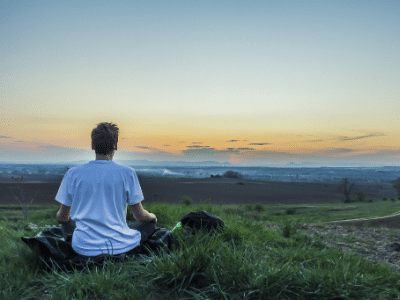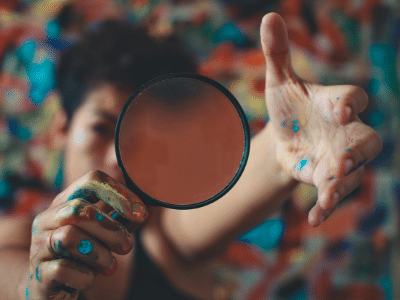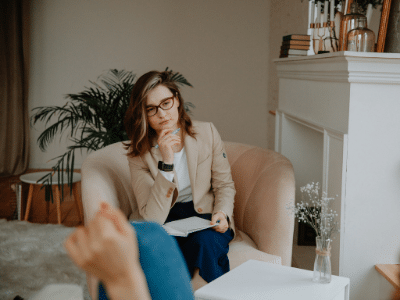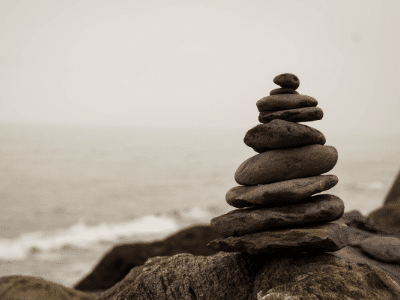

Think about times you noticed strong signs from the universe. Often, it's hard to give a logical explanation for what you're picking up. You just know that gut feeling.
Whether you'd describe it as trusting your gut or following your heart, we've all had those times when our intuitions are so strong that we can't ignore them.
However, many people are raised to try and suppress these feelings and encouraged to believe they're unreliable. So, how much weight should you give to intuition?
In this article, we'll look at what it really means to follow your gut, and consider where gut feelings come from. We'll explore the difference between following your heart and trusting your gut, and we'll look at what can go wrong when you choose to simply ignore your gut feelings.
Most importantly, we'll offer some concrete steps you can take in order to develop your ability to trust your own intuition.

Let's start with our core question: what is a gut feeling? Sometimes called instincts or intuitions, gut feelings allow you to make leaps of reasoning that are not supported by traditional evidence.
For example, they might suddenly make you aware that you're in danger, even if you don't know why. Or they might pull you to talk to someone or go somewhere you've never been. But where do they come from?
Your first assumption might be that your gut feeling literally comes from the gut. As it turns out, the millions of nerve cells found in your gut probably do play a role, but so does the brain.
In particular, certain events and experiences trigger your brain to send signals that result in the characteristic “knowing” associated with gut feelings.
Recent research in psychology suggests many gut feelings are the result of extremely quick mental processing.
In other words, your brain works through all of its stored information, links current events to one previous experience, and presents you with a suggested meaning for those events. All of this can happen in seconds.
Now that you have a rough sense of where gut feelings turn from, we can turn to consider whether they're reliable.
You've probably heard the phrase “Always trust your gut”, and maybe you've even found that your own experience supports this claim. As noted above, your gut feelings likely come from extremely fast processing done by parts of your subconscious mind.
This gives us good reason to think that you should indeed trust your gut. After all, you generally trust your brain to consciously evaluate evidence, so it seems reasonable to trust these quick, general assessments too.
Generally, studies show us that gut feelings are most useful when you need to make a quick decision. They're also helpful when you want to make a first assessment of a problem.
In addition, gut feelings can tell you things that your conscious defenses might normally block from your awareness. That said if you have time to make a decision it's always wise to consider your gut feelings alongside other evidence, as gut feelings are more like broad assessments than detailed evaluations.

People often talk about trusting or following the gut in the same way that they say you should follow your heart. So, are these just the same thing?
You can think of following your heart as following a very specific kind of gut feeling. To clarify, trusting your heart is about trusting gut feelings that relate to your emotional life.
For example, pursuing love against the odds is one example of following your heart. Similarly, trusting someone even when you're worried about being hurt again can be a way of following your heart.
The important contrast is not heart vs. gut, then, but rather gut (or heart) vs. brain. In other words, you're most likely to experience conflicts between your intuitions and the rational, dispassionate assessments made by the logical center of your brain.
And although your brain has reliable lessons to impart, ignoring your gut can get you into serious trouble. Let's take a closer look at why.
If you question your gut feelings instead of using them as the rich resources they are, you can hold yourself back. Here are four of the most common problems you might encounter if you are scared to go with your gut.
These issues crop up in all areas of life, from your friendships and relationships to your work life and creative endeavors.
As we consider in the next section, you can overcome these hurdles if you tap into the power of intuition and harness your instincts.

Acting on intuitions and gut feelings is all about instinctive understanding. It sometimes takes mere seconds. In contrast, if you suppress your intuitions, it's easy to fall into overthinking.
In other words, you analyze some choice or situation in so much depth that you become paralyzed. Ultimately, you give too much weight to conscious reasoning, tying yourself in knots as you look at the pros and cons.
When you put huge amounts of thought into all possible outcomes you might face, you move away from your valuable intuitions.
For example, suppose you have a chance to apply for a new job, and you have a flash of initial instinct that tells you to go for it.
If you're scared to do so, you can reason your way into making a decision not to. In such cases, your thought process is no longer free-flowing or natural, but instead often involves rationalizations that keep you from growing.

If you don't give weight to intuitions, you can also end up mired in self-doubt. In particular, you can question everything you think and feel.
You lose touch with what's best for you, and end up instead asking things like “Will others like me less if I do this?” or “Should I have done something else before pursuing this opportunity?”.
As you can see, your focus turns outwards, and you start to try and assess yourself according to imagined standards set by society or by other people.
That said, there is value to asking questions before asking, even when you have a strong gut feeling. It's just that such questions should take the form of “How will I feel about myself if I do this?” and “Is doing this an authentic thing for me?”.
Our strategies below will help you cut back on questions and keep the relevant questions focused on yourself.

Ignoring gut feelings also makes room for other people to apply pressure. Often, we have individuals waiting in the wings to tell us what they would do, or what they would like us to do.
This might be loved ones (especially older relatives, like parents), or it might be authority figures (such as bosses or mentors). If we give them time and space to voice their needs or preferences, this can dominate our decisions.
Basically, the person who makes their case most forcefully ends up being the one to make the decision, even if they don't know best.
Meanwhile, if you take instincts and gut feelings as the major deciding factor, you get two benefits. Firstly, you're likely to act quickly, preventing others from influencing you too much.
Secondly, you are more likely to stay in the driver's seat even when others do pressure you, as you take your intuitions as the primary authority.

Finally, painful past experiences is another of the most common yet complex issues involved in ignoring your gut feelings.
For example, if you've been through particularly traumatic experiences in your childhood or in close relationships, it can be very difficult to trust yourself as an adult.
In particular, if you've been in some kind of abusive dynamic with someone (whether it was a friend, lover, parent, or employer), you may not believe your own gut instincts.
Even if you realize that such people or experiences misled you, it's incredibly hard to completely get rid of the underlying negative beliefs.
If you think that past pain is one of the things stopping you from tuning into your gut, the best thing you can do is commit to processing that pain.
Whether you use therapy, journaling, or some kind of artistic output, empowering yourself is vital if you want to revive your intuitions.
One of the lessons from the above is that there's an intimate connection between trust and intuition. In particular, you need to trust yourself if you're to feel and follow your gut feelings.
Let's flesh out what such trust involves, then consider practical ways to build it in your everyday life.

Trusting yourself boils down to three main things: identifying and expressing your own needs, adhering to standards that you set, and believing you can survive difficulty.
Here are some illustrative examples of self-trust that involves:
While you may now feel like you understand what it would be to trust yourself, how do you trust yourself in reality?
How do you become confident in identifying and acting on your gut feelings?
Here are four things you can do to start boosting your self-trust almost immediately.

Increasing your self-knowledge helps you trust your own judgment – especially on what's good for you. The more you get to know about yourself, the easier it is to live an authentic life.
And once you start feeling more confident about who you really are, trusting yourself becomes easier and easier. Keeping a daily journal can help you here, as can engaging with general self-reflections. Here are a few to get you started:

By stepping out of your comfort zone, you become increasingly confident that you can deal with anything. We often limit ourselves, creating arbitrary rules and boundaries that keep us small.
Consequently, you have no idea just how powerful and capable you are until you try something new.
By letting yourself venture into the unknown and face new challenges, you get loads of new evidence of your own competence.
Even if things don't go to plan, just the evidence of your survival helps to boost your faith in your own abilities.
In short, you learn to trust all aspects of yourself – including your gut feeling.

We already mentioned that self-trust involves acknowledging and trying to meet your needs. Part of this is developing self-compassion.
Try to talk to yourself in a kind way, as you would a friend. For example, don't expect yourself to be perfect.
Think about it – you only require your loved ones to be good enough, not perfect.
It's okay to get things wrong, or not do as well as you could. Be vigilant about your inner critic, noticing negative self-talk, and actively working to combat it.
You might answer your inner critic out loud, for example, or write down new, positive messages to counteract your outdated negative beliefs,

Creative visualization is a process by which you imagine yourself doing the things you want to.
For example, athletes might visualize themselves taking the perfect golf swing.
You can visualize yourself making successful, confident decisions, and regularly doing this will start to change the way you see yourself.
Similarly, you can create a vision board where you collect images that represent how you want to see yourself.
This can be made to cut out images, photographs, drawings, and words.
Anything goes, as long as it encourages you to think about your goals and reinforces your confidence in your decisions.

Ultimately, making the best use of your gut feeling is really about trusting yourself to make the right decision. Deep down, you absolutely know what's best for you.
Your conscious mind will throw up all sorts of “rational” reasons to avoid decisions or make them safe. After all, that part of your mind just wants to keep you safe.
Try to be grateful for its presence, but remember that it is fundamentally misguided. Instead, tune into and listen to that other voice – the voice that tells you that you can do anything. Try to let that confident, loving voice be in charge more often.
Doing so requires letting go of other people's opinions, reminding yourself that your opinion is what matters in your life.
While there's no guarantee that things will be easy, there's so much out there to experience and enjoy if you go where your gut feeling and heart lead you.
Let's close by looking at four more things to keep in mind when learning how to balance the input of your heart (or gut) and brain. Remember, it's not simply a matter of ignoring what your brain tells you.
Rather, it's about learning to value what your gut says, and knowing when to stop your brain from interfering. Both parts of your are deeply valuable, and in an ideal scenario, you'll learn how and when to call on both. Here's some advice that will help you.

We've stressed how important it is to trust your heart.
To learn how to do this more effectively, it's helpful to learn about your Intention Point. You can think of the Intention Point a the place where your heart and mind meet.
When you access this precise point of connection, you gain deeper insights into what you want in life.
It stands halfway between intuition and rationality, and you can use it to get rid of the dissonance that causes indecision and inner conflict.
In everyday life, you can begin to access the Intention Point by writing down what your heart tells you about something alongside what your brain tells you, and looking for the overlap this process is called an intention statement.
Where these two parts of you are in agreement, the heart is balanced with the mind.
To learn more about how to harness the power of your Intention Point, join our Origins program.

If you're not used to trusting and following your gut feelings, it takes time and effort to become more aware of them. There are a few things you can do to tune into your intuitions.
One is to practice deep, meditative breathing when you have a decision to make, and simply let your intuitions flow into your awareness. Notice them without judgment, and treat them as evidence in favor of a particular choice.
Another strategy is to allow yourself to write an unedited stream of consciousness. For example, you might write down a list of headings related to your work life, your social life, your family, and your hobbies.
Then, under each, write the first words that come to mind, even if they don't make sense to you at first. Later, reread what you've written under each heading and try to identify the intuitions.
You can do this for any major decision or any of the importance in your life.

As just noted, meditative breathing can help you shut out extraneous noise and focus on your feelings. However, it's also worth pursuing a longer-term mindfulness practice, ideally once per day.
This will help you cultivate the habit of observing yourself without criticism. One effective mindfulness exercise involves body scanning. Simply sit for a few minutes, breathing deeply, and then work your attention down your body.
Starting with the top of the head and ending with the feet, notice how each part of you feels. Where are you relaxed? Which parts feel tense? Are you sore? Do certain parts of your body feel good?
Ultimately, your body is a significant source of intuitions, so the tension and relaxation that you pick up in body scanning exercises can be really useful.
For example, widespread tightness in your muscles indicates anxiety or displeasure about your current situation. Meanwhile, when your body feels loose and good, you're likely on the right track.
By now, you have a more sophisticated understanding of gut feelings. You know that following your heart is one way of following gut feelings, and you know that without gut feelings you can easily become mired out and over-analysis.
You also have specific techniques and exercises to try in order to better tune into your gut feelings and grow the trust you have in yourself.
All of this will make a more positive, powerful person who is better at attracting the best things in life.
However, there's always room for improvement, especially when it comes to using your intuition to manifest your dreams. If you want to harness your heart's energy to raise your vibration and create the life you desire, we can help you.
Building on your existing understanding of the heart-mind divide, our Origins program guides you in using your Intention Point – the key to unlocking that powerful space between your heart and mind.
